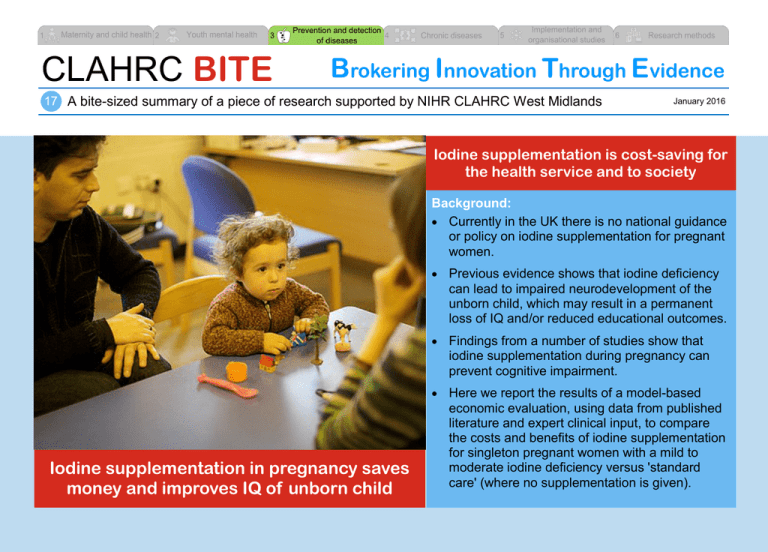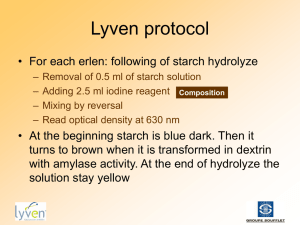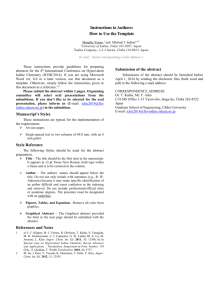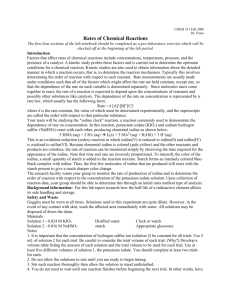CLAHRC BITE B
advertisement

CLAHRC BITE Brokering Innovation Through Evidence 17 A bite-sized summary of a piece of research supported by NIHR CLAHRC West Midlands January 2016 Iodine supplementation is cost-saving for the health service and to society Background: Currently in the UK there is no national guidance or policy on iodine supplementation for pregnant women. Previous evidence shows that iodine deficiency can lead to impaired neurodevelopment of the unborn child, which may result in a permanent loss of IQ and/or reduced educational outcomes. Findings from a number of studies show that iodine supplementation during pregnancy can prevent cognitive impairment. Here we report the results of a model-based Iodine supplementation in pregnancy saves money and improves IQ of unborn child economic evaluation, using data from published literature and expert clinical input, to compare the costs and benefits of iodine supplementation for singleton pregnant women with a mild to moderate iodine deficiency versus 'standard care' (where no supplementation is given). Findings: A decision-tree model was used to carry out two analyses of the costs and benefits from a health service perspective and a wider societal perspective. Conservative assumptions were used regarding potential benefits, and potentially overestimating adverse outcomes. Iodine supplementation was shown to be ‘dominant’ in both scenarios. This means iodine supplementation saved money and improved IQ when compared to standard care. The analysis from the health service perspective showed a cost saving of £199 per mother and an average gain of 1.22 IQ points for the child. The analysis from a wider societal perspective showed a cost saving of £4476 per mother and an average gain of 1.22 IQ points for the child. Sensitivity analysis supported the cost-saving indication of these results in all but the most extreme scenario, i.e. assuming no effect on the child’s IQ for mothers who would be otherwise mild/moderately iodine deficient. Reference Monahan M, Boelaert K, Jolly K, et al. Costs and benefits of iodine supplementation for pregnant women in a mildly to moderately iodine-deficient population: a modelling analysis. Lancet Diabetes Endocrinol. 2015; 3(9): 715-22. [goo.gl/pgnN5r] Recommendations for Practice Findings suggest that iodine supplementation could save money and improve IQ. Current evidence suggests that a policy to introduce iodine supplementation during pregnancy would be beneficial to both the health service and society. What is NIHR CLAHRC West Midlands? The Collaborations for Leadership in Applied Health Research and Care (CLAHRC) is a partnership between universities (Birmingham, Warwick and Keele) and a number of health and social care organisations in the West Midlands. We are funded by the National Institute for Health Research with a mission to undertake high-quality applied health research focused on the needs of patients to improve health services locally and beyond. For further information, visit: www.clahrc-wm.nihr.ac.uk The research is funded by the National Institute for Health Research. The views expressed are those of the author and not necessarily those of the NHS, the NIHR or the Department of Health.





